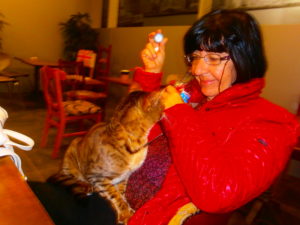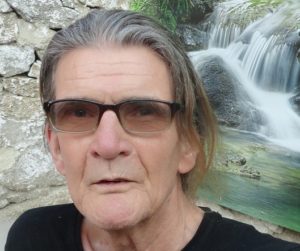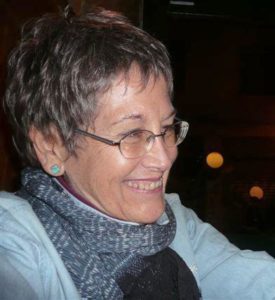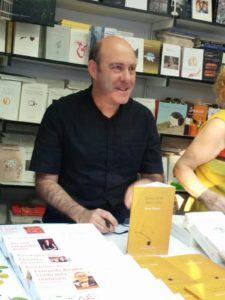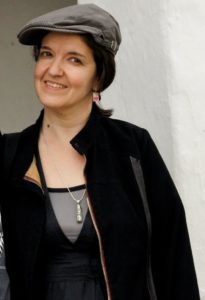I
No lo comprendo.
No sé
por qué hay que ir tan deprisa.
No entiendo
por qué hay que caminar tan rápido
ni por qué es tan temprano
ni por qué la calle está tan enturbiada y húmeda.
No entiendo
qué dice este rumor en tránsito
(este siseo infatigablemente frágil)
ni sé
a dónde llevan tantos pasos
con la obstinada decisión de no perderse.
II
Estoy en la puerta de mi casa:
desde aquí puedo ver,
tras los cristales,
un copo de cielo,
un harapo azul sin horizonte,
un fragmento de distancia,
un tragaluz de lejanía.
Cierro la puerta
y no lo entiendo,
pero hago un gran esfuerzo en retener
ese jirón azul en la pupila
y pienso en la corona de espuma del ahogado
y en los clavos grises que me aguardan.
Sin embargo, ya sé que no hay coronas:
estamos muy lejos del mar
y yo llevo los ojos llenos de bruma y humo
como si los cubriera la sombra de una lágrima
que aún no he sabido llorar.
Digo que lo sé, pero no estoy segura:
tan solo
cierro la puerta de mi casa
como si cerrara la puerta de mi alma
o de algún alma
que se parece demasiado a la mía.
III
Parece temprano,
parece pronto,
quisiera decir: la ciudad se despierta
o nace el día
o empieza un día más.
Pero no lo entiendo,
no consigo entenderlo:
he bajado las escaleras
y he llegado a un lugar
que dice llamarse calle;
desde luego, no veo náufragos coronados
ni distingo a los viajeros de los comerciantes
ni a los habitantes de los ciudadanos
ni a los abogados de los turistas
ni a mí de mí.
En este momento,
tan solo reconozco mis zapatos
y su exuberante y urgente necesidad
por incorporarse al ajetreo de la vía.
IV
Es pronto:
no sé a dónde,
pero hemos llegado pronto.
Por lo demás, todo sigue.
Aunque yo no entienda lo que dice la palabra prisa
aunque no sepa lo que nombra la palabra ruido,
aunque no comprenda lo que calla la palabra calla,
los zapatos silenciosos,
en su obstinada decisión de no perderse,
lo entienden todo por mí.
HALF PAST EIGHT
I
I don´t understand.
I don´t know
why one has to go about in such a rush.
I don´t get
why one should walk so fast
nor why it´s so early
nor why the street is so muddy and wet.
I don´t see
what this transitory whisper in transit says
(this restlessly fragile hiss)
nor do I know
where all these steps are heading
in the obstinate decision not to lose themselves.
II
I stand in the doorway of my home:
from here I can see
a streak of sky behind the glass
a blue rag without horizon,
a fragment of distance,
a skylight of distance.
I close the door
and don´t understand
but I try with great effort to keep
that blue strip in my pupil
and I think of the foamy garland of the drowned
and the grey nails awaiting me.
Yet I know there are no garlands
and we´re far from the sea;
I lift my eyes and they´re full of fog and smoke
as if covered by the shadow of a tear
a tear I haven´t yet wept.
I say I know, but I´m not sure:
I just close the door of my house
as if I ´d closed the door of my soul
or someone else´s soul
too similar to mine.
III
It seems early,
apparently too soon,
I would like to say: the city awakens
or the day is born
or another day begins.
But I don´t see it,
I can´t understand:
I have gone downstairs
to a place supposed to be called street;
obviously I see no garlanded shipwrecks,
I do not distinguish travellers from merchants
nor inhabitants from citizens
nor lawyers from tourists
nor myself from myself.
At this moment
I recognize only my shoes
and their exuberant urgent need
to join the teeming throng.
IV
It´s soon:
I don´t know where,
but we have arrived soon.
Otherwise, everything goes on.
Even though I don´t understand what the word hurry means
even though I don´t know what the word noise names,
even though I don´t grasp what the word hush hushes,
my silent shoes
in their obstinate decision not to lose themselves
understand everything in my place
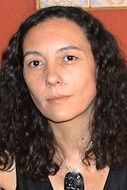
Guadalupe Grande was born in Madrid in 1965. She has a Bachelor degree in Social Anthropology. Published poetry books: El libro de Lilit, (Renacimiento, awarded the 1995 Rafael Alberti Award, 1995), La llave de niebla (Calambur, 2003), Mapas de cera (Poesía Circulante, Málaga, 2006 and La torre degli Arabeschi, Milán, 2009), Hotel para erizos (Calambur, 2010) and Métier de crhysalide (an anthology, translated by Drothèe Suarez y Juliette Gheerbrant, Alidades, Évian-les-Bains, 2010).
As a literary critic, she has published in cultural journals and magazines, such as El Mundo, El Independiente, Cuadernos Hispanoamericanos, El Urogallo, Reseña and others.
In 2008 she was awarded the Valle Inclán grant for literary creation in the Academia de España in Rome.
In the publishing and cultural management areas, she has worked in institutions such as the Complutense University of Madrid Summer Courses, Casa de América and Teatro Real. Currently she manages poetical activities in the José Hierro Popular University at San Sebastian de los Reyes, Madrid.
The poems “Ocho y media” (Half past eight) and “Madrid, 1973” belong to La llave de niebla, (Key of Mist) which has been translated into English by Robin Ouzman Hislop and Amparo Arróspide.
***
Guadalupe Grande nació en Madrid en 1965. Es licenciada en Antropología Social.
Ha publicado los libros de poesía El libro de Lilit, (Renacimiento, Premio Rafael Alberti 1995), La llave de niebla (Calambur, 2003), Mapas de cera (Poesía Circulante, Málaga, 2006 y La torre degli rabeschi, Milán, 2009), Hotel para erizos (Calambur, 2010) y Métier de crhysalide (antología en traducción de Drothèe Suarez y Juliette Gheerbrant, Alidades, Évian-les-Bains, 2010).
Como crítico literario, ha colaborado en diversos diarios y revistas culturales, como El Mundo, El Independiente, Cuadernos Hispanoamericanos, El Urogallo, Reseña, etcétera.
En el año 2008 obtuvo la Beca Valle Inclán para la creación literaria en la Academia de España en Roma.
En el ámbito de la edición y la gestión cultural ha trabajado en diversas instituciones como los Cursos de Verano de la Universidad Complutense de Madrid, la Casa de América y el Teatro Real. En la actualidad es responsable de la actividad poética de la Universidad Popular José Hierro, San Sebastián de los Reyes, Madrid.
Los poemas “Ocho y media” y “Madrid, 1973” pertenecen a La llave de niebla y han sido traducidos al inglés por Robin Ouzman Hislop y Amparo Arróspide.
Translators:
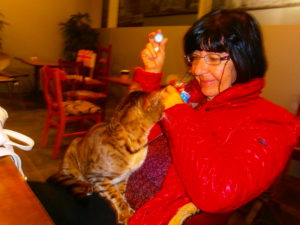
Amparo Arróspide (Argentina) has published five poetry collections: Presencia en el Misterio, Mosaicos bajo la hiedra, Alucinación en dos actos y algunos poemas, Pañuelos de usar y tirar and En el oído del viento, as well as poems, short stories and articles on literature and films in anthologies and international magazines. She has translated authors such as Francisca Aguirre, Javier Díaz Gil, Luis Fores and José Antonio Pamies into English, together with Robin Ouzman Hislop, who she worked with for a period as co-editor of Poetry Life and Times, at Artvilla.com a Webzine. Her translations into Spanish of Margaret Atwood (Morning in the Burned House), James Stephens (Irish Fairy Tales) and Mia Couto (Vinte e Zinco) are in the course of being published, as well as her two poetry collections Hormigas en diáspora and Jacuzzi. She takes part in festivals, recently Transforming with Poetry (Leeds) and Centro de Poesía José Hierro (Getafe).
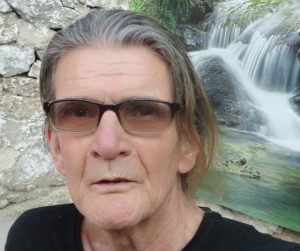
https://www.facebook.com/PoetryLifeTimes
https://www.twitter.com/PoetryLifeTimes
Robin Ouzman Hislop is Editor of Poetry Life and Times ; at Artvilla.com his publications include
All the Babble of the Souk , Cartoon Molecules, Next Arrivals, Collected Poems, and the recently published Moon Selected Audio Textual Poems, as well as translation of Guadalupe Grande´s La llave de niebla, as Key of Mist and the recently published Tesserae , a translation of Carmen Crespo´s Teselas.
You may visit Aquillrelle.com/Author Robin Ouzman Hislop about author. See Robin performing his work Performance (University of Leeds)


